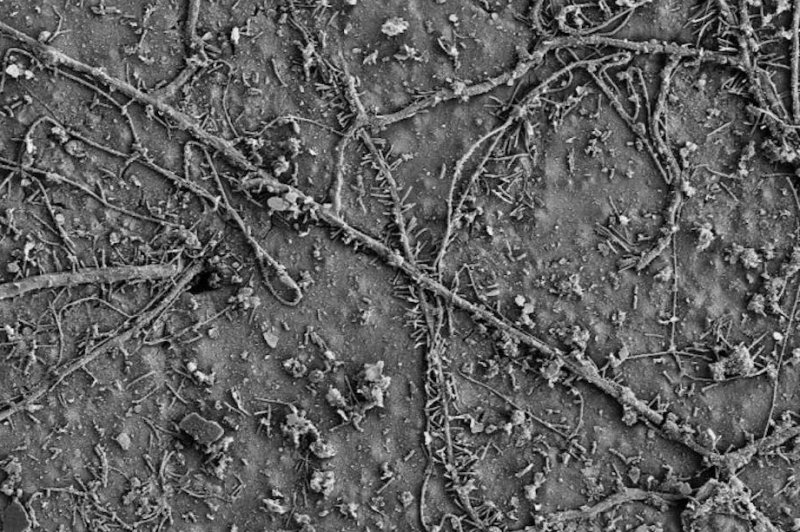A microscope image shows microbes colonizing and breaking-down the surface of a synthetic polymer in the soil. Photo by ETZ Zurich
July 25 (UPI) -- New research shows an alternative plastic called PBAT -- short for poly(butylene adipate-co-terephthalate) -- can be broken down by microbes in the soil.
Researchers hope the material can serve as a replacement for polyethylene mulch films. Large amounts of PE films are spread cross agricultural fields to boost crop yields by elevating soil temperature and keeping moisture in the ground.
Disposing of the plastic sheeting is difficult and, inevitably, large amounts of the plastic end up accumulating in the soil. Polyethylene contamination can disrupt water transportation and ultimately degrade soil health.
Researchers at ETH Zurich wanted to find out if a polymer alternative like PBAT would be more eco-friendly. The polymer had been deemed biodegradable for composting, but not for use in agriculture.
For their experiment, scientists synthesized PBAT with a precise amount of carbon-13 isotope. This allowed researchers to track the breakdown of carbon along various biodegradation pathways.
In soil samples, scientists were able to track the conversion of the polymer's carbon into boimass and energy production, as well as the byproduct CO2.
"The beauty of our study is that we used stable isotopes to precisely track PBAT-derived carbon along different biodegradation pathways of the polymer in the soil," ETH researcher Michael Zumstein said in a news release.
Zumstein and his colleagues -- who detailed their work this week in the journal Science Advances -- claim their study is the first to show a plastic is truly biodegradable in the soil.
"By definition biodegradation demands that microbes metabolically use all carbon in the polymer chains for energy production and biomass formation -- as we now demonstrated for PBAT," said Hans-Peter Kohler, environmental microbiologist at Eawag. "Many plastic materials simply crumble into tiny fragments that persist in the environment as microplastics -- even if this plastic is invisible to the naked eye."
Researchers say they're still a long way from curbing the pollution caused by the the global plastics industry, but that plastic biodegradability is a step in the right direction.















